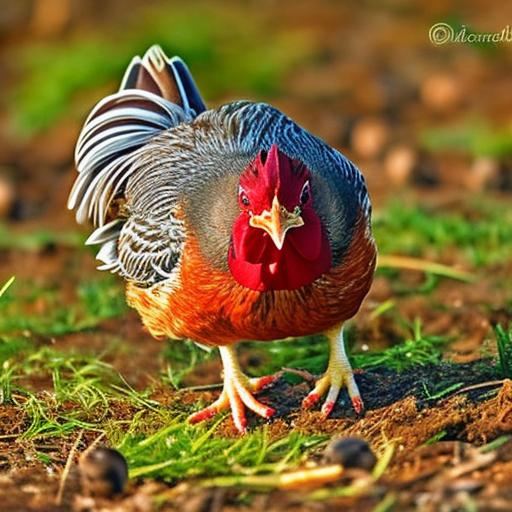Raising chickens in Chester, SC has become a popular hobby for many residents. Not only do chickens provide a sustainable source of fresh eggs, but they also offer a unique and rewarding experience for families. In this article, we will explore the benefits of raising chickens and provide tips for ensuring their health and well-being.
Providing Adequate Space for Your Flock
One of the most important aspects of raising chickens is providing them with adequate space to live and roam. Chickens need space to move around, stretch their wings, and engage in natural behaviors such as scratching and dust bathing. The amount of space needed per chicken depends on the breed and size of the bird, but a general rule of thumb is to provide at least 4 square feet of space per bird in the coop, and 10 square feet per bird in the outdoor run.
To create a comfortable living space for your flock, consider adding roosting bars for them to perch on at night, nesting boxes for laying eggs, and plenty of bedding material such as straw or wood shavings. It’s also important to ensure that the coop is well-ventilated to prevent the buildup of ammonia from chicken droppings.
Choosing the Right Feed for Your Chickens
Feeding your chickens a balanced diet is essential for their health and egg production. There are different types of chicken feed available on the market, including pellets, crumbles, and mash. Pellets are a popular choice as they contain a mix of grains, protein, vitamins, and minerals. Crumbles are smaller pieces of feed that are easier for young chicks to eat, while mash is a finely ground feed that can be mixed with water to create a porridge-like consistency.
When choosing feed for your flock, it’s important to consider their nutritional requirements. Chickens require a diet that is high in protein, especially during periods of growth or egg-laying. Look for feeds that contain around 16-20% protein. It’s also important to provide your chickens with access to fresh water at all times.
Maintaining a Clean and Hygienic Coop
Keeping a clean coop is crucial for the health and well-being of your chickens. A dirty coop can lead to the buildup of bacteria, parasites, and disease, which can negatively impact your flock. Regular cleaning of the coop is necessary to remove droppings, soiled bedding, and any other debris.
To clean a chicken coop, start by removing all chickens from the area and transferring them to a safe location. Remove all bedding material and sweep or scrape away any droppings or debris. Use a mild detergent or disinfectant to clean the surfaces of the coop, paying special attention to nesting boxes and roosting bars. Rinse thoroughly with water and allow the coop to dry before adding fresh bedding material.
Providing Access to Fresh Water at All Times
Water is essential for the health and well-being of chickens. Chickens need access to fresh, clean water at all times to stay hydrated and maintain their body temperature. It’s important to provide water in a clean container that is large enough for all chickens to drink from comfortably.
To ensure your chickens have access to water at all times, consider using a waterer with a built-in automatic refill system. This will help prevent the water from becoming contaminated or running out. It’s also important to regularly clean and refill the water container to prevent the buildup of algae or bacteria.
Protecting Your Chickens from Predators
In Chester, SC, there are several common predators that pose a threat to chickens, including raccoons, foxes, snakes, and hawks. It’s important to take measures to protect your flock from these predators to ensure their safety.
To protect your chickens from ground predators such as raccoons and foxes, consider installing a secure fence around the coop and run area. The fence should be buried at least 12 inches deep to prevent predators from digging underneath. You can also use hardware cloth or wire mesh to cover windows and openings in the coop to prevent entry.
To protect against aerial predators such as hawks, consider covering the outdoor run with netting or wire mesh. This will prevent them from swooping down and attacking your chickens. It’s also important to provide your chickens with a secure shelter within the coop where they can hide if they sense danger.
Ensuring Proper Ventilation in the Coop
Proper ventilation is essential for maintaining good air quality in the chicken coop. Ammonia buildup from chicken droppings can lead to respiratory issues and other health problems for your flock. It’s important to ensure that the coop has adequate airflow to prevent this buildup.
To ensure proper ventilation, consider installing windows or vents in the coop that can be opened and closed as needed. This will allow fresh air to circulate and remove any stale or ammonia-laden air. It’s also important to regularly clean the coop to remove any droppings or debris that could contribute to poor air quality.
Promoting Exercise and Outdoor Time for Your Flock
Exercise is important for chickens as it helps keep them healthy and prevents obesity. Allowing your flock access to outdoor space is beneficial for their physical and mental well-being. Chickens love to scratch, peck, and explore their surroundings, so providing them with a safe outdoor area is essential.
To promote exercise and outdoor time, consider creating a fenced-in run area where your chickens can roam freely. This area should be secure from predators and have plenty of shade, shelter, and areas for dust bathing. You can also provide them with toys or objects to peck at, such as hanging cabbage or a treat dispenser.
Monitoring Your Chickens’ Health and Well-being
Monitoring your chickens’ health is important for catching any potential issues early on and ensuring their overall well-being. Regularly observe your flock for any signs of illness or distress. Healthy chickens should have bright eyes, clean feathers, and be active and alert.
It’s also important to monitor their egg production, as a sudden decrease in laying could be a sign of an underlying health issue. Regularly check for any abnormalities in their droppings, such as diarrhea or blood, as this could indicate a digestive problem or parasite infestation.
Treating Common Chicken Ailments in Chester, SC
In Chester, SC, there are several common chicken ailments that can affect your flock. These include respiratory infections, parasites such as mites or lice, and egg-laying issues. It’s important to be familiar with these ailments and know how to treat them.
If you suspect that your chickens have a respiratory infection, such as infectious bronchitis or mycoplasma gallisepticum, it’s important to isolate the affected birds and seek veterinary advice. Treatment may involve antibiotics or supportive care to help alleviate symptoms.
To prevent and treat parasites such as mites or lice, regularly inspect your chickens for any signs of infestation, such as feather loss or redness around the vent area. There are various treatments available, including dusting powders or sprays that can be applied directly to the birds or their bedding.
Happy and Healthy Chickens in Chester, SC
Raising chickens in Chester, SC can be a rewarding experience for families. By providing adequate space, choosing the right feed, maintaining a clean coop, providing fresh water, protecting against predators, ensuring proper ventilation, promoting exercise and outdoor time, monitoring health, and treating common ailments, you can ensure that your flock is happy and healthy.
In addition to the personal benefits of raising chickens, such as a sustainable source of fresh eggs, there are also benefits for the community. Chickens can help reduce food waste by consuming kitchen scraps, and their manure can be used as fertilizer for gardens. They also provide an educational opportunity for children to learn about responsibility and the natural world.
Overall, raising chickens in Chester, SC is a fulfilling and worthwhile endeavor that can bring joy and sustainability to your family and community. By following these tips and guidelines, you can create a thriving flock that will provide you with years of enjoyment.
Meet Walter, the feathered-friend fanatic of Florida! Nestled in the sunshine state, Walter struts through life with his feathered companions, clucking his way to happiness. With a coop that’s fancier than a five-star hotel, he’s the Don Juan of the chicken world. When he’s not teaching his hens to do the cha-cha, you’ll find him in a heated debate with his prized rooster, Sir Clucks-a-Lot. Walter’s poultry passion is no yolk; he’s the sunny-side-up guy you never knew you needed in your flock of friends!








